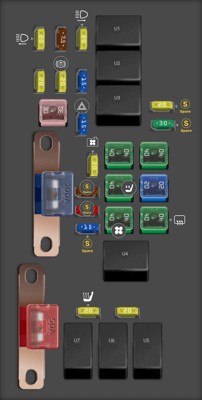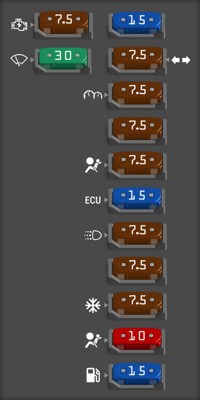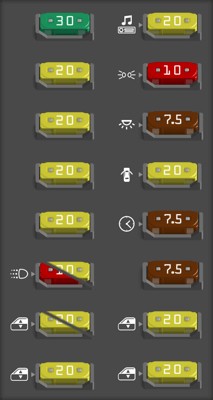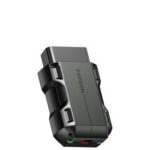Understanding your 2002 Honda Accord’s fuse boxes is crucial for diagnosing and resolving electrical issues, especially when it comes to using your OBD2 scanner. Fuses protect your vehicle’s electrical circuits, and a blown fuse can be the culprit behind various problems, including issues that might prevent your OBD2 scanner from connecting or functioning correctly. This guide will walk you through the fuse box locations and layouts in your 2002 Honda Accord, helping you pinpoint fuses that could be relevant to your OBD2 diagnostics.
Your 2002 Honda Accord is equipped with three distinct fuse boxes, each serving different electrical systems. Knowing where these fuse boxes are and what fuses they contain is the first step in troubleshooting electrical problems and ensuring your OBD2 port and related systems are functioning as expected. Let’s explore each fuse box in detail.
Under-Hood Fuse Box Diagram
The primary fuse box in your 2002 Honda Accord is located under the hood. This box houses fuses and relays that protect critical engine and vehicle systems. It’s often the first place to check for issues related to starting, lighting, and major electrical components.
| Type | No. | Description |
|---|---|---|
| Fuse MINI 20A | 1 | Left Headlight |
| Fuse MINI 7.5A | 2 | Instrument panel lights (Dimmer Relay) |
| Fuse MINI 20A | 3 | Right Headlight |
| Fuse MINI 20A | 4 | Anti-lock braking system (ABS F/S) |
| Fuse MINI 20A | 5 | Stop lights |
| Fuse MINI 15A | 6 | Battery and charging system (ACG) |
| Fuse FMX/JCase 30A | 7 | Anti-lock braking system (ABS Motor) |
| Fuse MINI 15A | 8 | Hazard light |
| Fuse MINI 20A | 9A | Spare Fuse |
| Fuse FLB/PAL 295 100A | 10 | Battery and charging system (Battery) |
| Fuse MINI 20A | 11 | Electric cooling fan |
| Fuse FMX/JCase 40A | 12 | Backup lights, ACC |
| Fuse FMX/JCase 40A | 13 | Power windows (Power Window Motor) |
| Fuse MINI 7.5A | 14A | Spare Fuse |
| Fuse FMX/JCase 40A | 15 | Power seats |
| Fuse FMX/JCase 20A | 16 | BSC |
| Fuse FMX/JCase 40A | 17 | AC blower motor (Heater Motor) |
| Fuse FMX/JCase 40A | 18 | Rear defroster |
| Fuse MINI 20A | 19 | Seat heater |
| Fuse MINI 20A | 20 | AC condenser fan |
| Fuse FLB/PAL 295 50A | 21 | Protects several circuits (IG1 Main) |
| Fuse MINI 10A | 14B | Spare Fuse |
| Fuse MINI 15A | 14C | Spare Fuse |
| Fuse MINI 30A | 9B | Spare Fuse |



Interior Fuse Box (Driver’s Side) Diagram
The second fuse box is located inside the cabin on the driver’s side. This panel often controls interior electronics and systems that are essential for the car’s operation and diagnostics. If you’re experiencing issues with interior lights, the instrument panel, or potentially OBD2 related systems, this is a key fuse box to investigate.
| Type | No. | Description |
|---|---|---|
| Fuse MINI 15A | 1 | Fuel Pump |
| Fuse MINI 10A | 2 | SRS |
| Fuse MINI 7.5A | 3 | Heater Control, A/C Clutch Relay, Cooling Fan Relay (HAC) |
| Fuse MINI 7.5A | 4 | R/C Mirror |
| Fuse MINI 7.5A | 5 | Daytime Running Light [Canadian models] |
| Fuse MINI 15A | 6 | ECU (ECM/PCM), Cruise Control [On Canadian models] |
| Fuse MINI 7.5A | 7 | SRS, Moonroof, Washer |
| Fuse MINI 7.5A | 8 | ACC Relay |
| Fuse MINI 7.5A | 9 | Instrument Panel, Back-up Lights |
| Fuse MINI 7.5A | 10 | Turn Signals |
| Fuse MINI 15A | 11 | Ignition Coil |
| Fuse MINI 30A | 12 | Wiper |
| Fuse MINI 7.5A | 13 | Starter Signal (STS) |
OBD2 and Fuses: While there isn’t a fuse explicitly labeled “OBD2 fuse” in your 2002 Honda Accord, several fuses are vital for the systems that the OBD2 port relies on. Specifically, fuses related to the ECU/PCM (Engine Control Unit/Powertrain Control Module), ignition system, and power supply are crucial. If any of these fuses are blown, it can disrupt communication with the OBD2 port, preventing your scanner from working correctly.
- Fuse #6 (15A) in the Interior Fuse Box (Driver’s Side): This fuse is labeled “ECU (ECM/PCM)”. A blown fuse here is a prime suspect if you’re having OBD2 communication issues, as the ECU/PCM is the computer that your OBD2 scanner interfaces with.
- Fuse #11 (15A) in the Interior Fuse Box (Driver’s Side): Labeled “Ignition Coil,” this fuse is part of the ignition system, which is monitored by the ECU and can affect OBD2 readings if there are issues.
- Fuses in the Under-Hood Fuse Box: Several fuses under the hood relate to the overall power and engine management systems. While not directly labeled “OBD2,” fuses like “Battery and Charging System” (Fuses #6 & #10) and “IG1 Main” (Fuse #21) are fundamental for the electrical system to function, and problems here can indirectly impact OBD2 operation.
Interior Fuse Box (Passenger’s Side) Diagram
The third fuse box is located inside the cabin on the passenger’s side. This box generally manages accessories and convenience features, but it’s still worth checking if you’re experiencing electrical problems, particularly with interior components.
| Type | No. | Description |
|---|---|---|
| Fuse MINI 30A | 1 | Moonroof |
| Fuse MINI 20A | 2 | Driver Power Seat Recline |
| Fuse MINI 20A | 3 | Assistant Power Seat Recline |
| Fuse MINI 20A | 4 | Driver Power Seat Slide |
| Fuse MINI 20A | 5 | Assistant Power Seat Slide |
| Fuse MINI 10A | 6 | Daytime Running Light [Canadian models] / LAF Heater [US models except LX] |
| Fuse MINI 20A | 7 | Rear Left Power Window / Moonroof Relay [Special Edition, EX, EX-V6] |
| Fuse MINI 20A | 8 | Front Right Power Window |
| Fuse MINI 20A | 9 | Radio, Cigarette Lighter |
| Fuse MINI 10A | 10 | Small Lights |
| Fuse MINI 7.5A | 11 | Interior Light, Courtesy Lights |
| Fuse MINI 20A | 12 | Power Door Locks |
| Fuse MINI 7.5A | 13 | Clock, Back Up |
| Fuse MINI 7.5A | 14 | ABS Motor Check |
| Fuse MINI 20A | 15 | Front Left Power Window |
| Fuse MINI 20A | 16 | Rear Right Power Window |
Troubleshooting with Fuses and OBD2:
When you encounter problems using your OBD2 scanner with your 2002 Honda Accord, checking the relevant fuses is a smart initial step. Here’s a quick guide:
- No Power to OBD2 Scanner: If your OBD2 scanner isn’t powering on when connected, suspect a power-related fuse. Check the “ECU (ECM/PCM)” fuse in the interior driver’s side fuse box, as well as the main “Battery” and “IG1 Main” fuses under the hood.
- Scanner Powers On but Can’t Connect: If the scanner powers up but fails to establish a connection with the vehicle’s computer, again focus on the “ECU (ECM/PCM)” fuse. Also, consider fuses related to the ignition and engine management systems.
- Intermittent OBD2 Issues: Sometimes, a fuse might be partially blown or have a poor connection. This can lead to intermittent OBD2 issues. In such cases, visually inspect the fuses and consider replacing potentially problematic fuses even if they don’t appear completely blown.
By understanding the fuse box layouts and identifying fuses relevant to the ECU and related systems, you can effectively troubleshoot potential OBD2 issues in your 2002 Honda Accord. Remember to always consult your owner’s manual for the most accurate fuse information specific to your vehicle trim and options.
